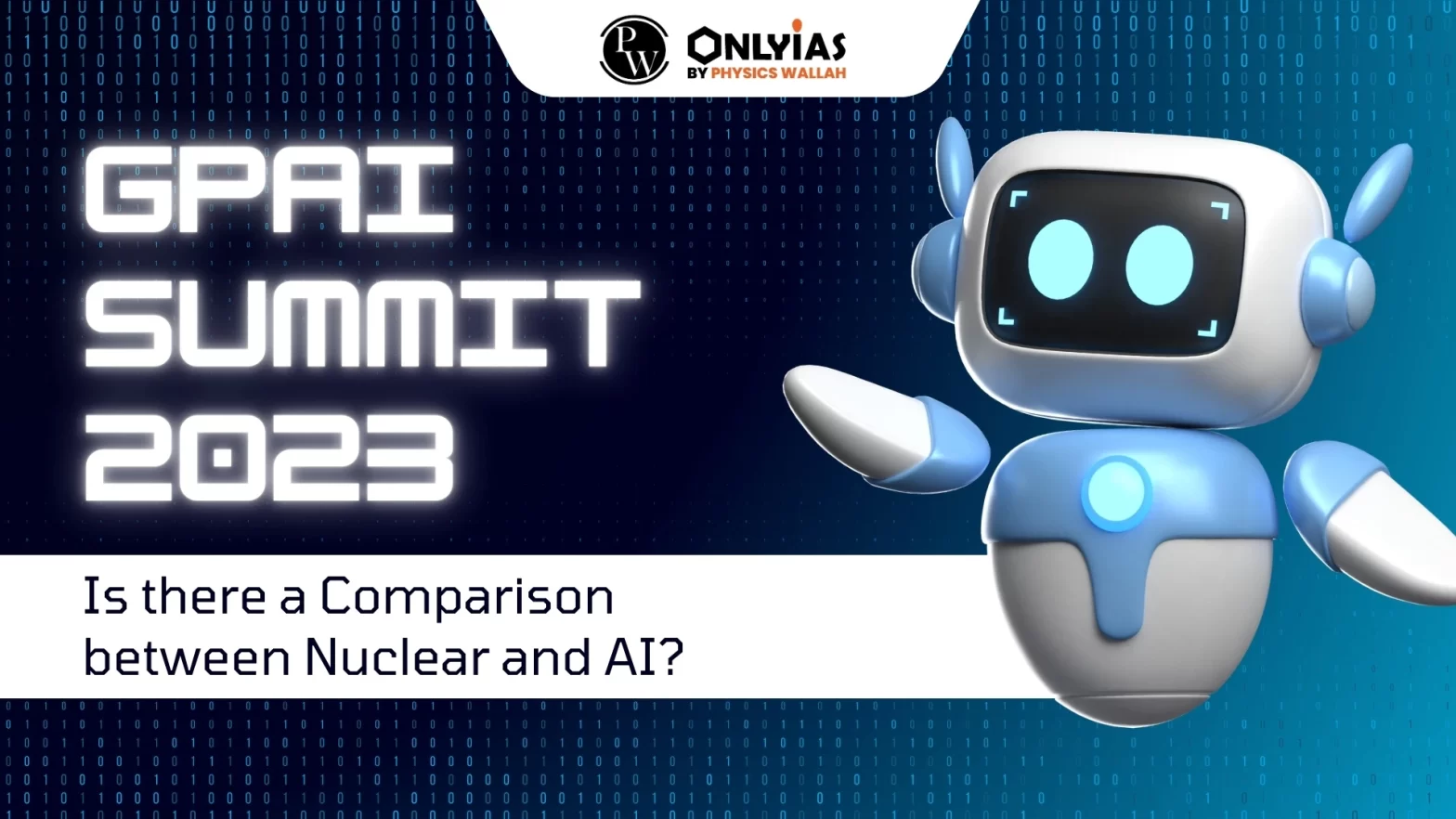Context: This article is based on an Editorial “C Raja Mohan writes: Why India cannot afford to repeat its nuclear weapons mistakes with AI” Which was published in the Indian Express. India will host the prestigious GPAI Summit 2023 in New Delhi from December 12 to 14, 2023.
- As India hosts the GPAI summit 2023, discussions are raised on the comparison of the nuclear revolution with advancement in Artificial Intelligence.
| Relevancy for Prelims: GPAI Summit 2023, Artificial Intelligence, OECD, and International Atomic Energy Agency (IAEA).
Relevancy for Mains: India’s nuclear policy, Artificial Intelligence- Need, Challenges, measures to harness the transformative power of AI. |
About Global Partnership for Artificial Intelligence (GPAI)
- An international Initiative: To guide the responsible development and use of artificial intelligence (AI) in a manner that respects human rights and the shared democratic values of its members.
- Formation: The Global Partnership for Artificial Intelligence (GPAI) was formed on June 15, 2020, and currently comprises 28 members.
- India had in 2020 joined the group as a founding member.
- Aim: GPAI is a multi-stakeholder initiative that aims to bridge the gap between theory and practice on AI by supporting cutting-edge research and applied activities on AI-related priorities.
- Collaboration and Cooperation: Built around a shared commitment to the OECD Recommendation on Artificial Intelligence, GPAI brings together engaged minds and experts from science, industry, civil society, governments, international organizations, and academia to foster international cooperation.
Also Read: AI Summit London 2023 – How to Make Artificial Intelligence Responsible
Why is there a Comparison between Nuclear and AI?
- Destructive Potential: Both have enormous destructive power.
- The nuclear revolution was revealed to the world by the use of atomic bombs against Hiroshima and Nagasaki, Japan in August 1945.
- The AI revolution threatens even bigger as machines take over from humanity and enslave them.
- Geopolitical Impacts: These challenges include how to:
- Manage the impact of geopolitical rivalry.
- Differentiate between the use and abuse of these technologies.
- Create international norms and institutions to govern its use.
- Control and Regulation: Like in the nuclear era, there is growing interest in promoting “arms control” agreements between the great powers.
- The US-China agreements on AI are seen as critical for the management of the AI revolution. However, both the US and China are developing the military uses of AI.
- Demand of Ban: As in the nuclear age, many today demand a ban on military uses of AI.
- Or at least a “freeze” on research and development until there is a better assessment of the technology.
- Management by International Norms:
- Proposal: Setting up of an “International Agency for Artificial Intelligence” (IAAI).
- Similar to the International Atomic Energy Agency (IAEA) that was set up in 1957 to regulate the uses of nuclear energy.
- Need: To manage the potential negative consequences of the AI revolution.
- Consistency of Pace: Like nuclear, the concerns have not slowed the rapid advances in AI.
- Economic Promises: The nuclear technology failed in its promise of delivering cheap electricity. However, AI promises to transform the economy, society, and politics.
Must Read: Non-Proliferation Treaty (NPT)
What can India learn from its nuclear history in dealing with the challenges of AI?
- Be Practical: Rather than following idealism this time, India needs to take pragmatic steps and gain a pace as soon as possible until it’s too late in the AI domain.
- Engagement and Partnership: India needs to build on the current momentum in the partnership with the US on AI and other critical and emerging technologies.
- India which was determined to befriend China missed the opportunity to become the first Asian country to possess nuclear weapons. US President John F Kennedy had sent a hand-written note in the early 1960s to help India build a nuclear weapon.
- Application of Technology: India needs to come out with her traditional temptation to find a “third way” in technological development and proclaim India’s exceptionalism.
- While the application of technology can be country-specific and context-dependent, science and technology are universal.
The Path Ahead:
- Develop and Boost Domestic Capabilities: India needs to build strong domestic capabilities in AI is critical to making the best out of international cooperation.
- Participation of the Private Sector: The time has come for the involvement of the private sector.
- If technological progress in the second half of the 20th century — especially in nuclear and space — were led by governments, it is the private sector that is leading AI research, development, and innovation in the West.
- Need Reforms: The government’s recent efforts in the Science and Technology sectors are significant, however, they require reforms as per the current and required pace.
- Realistic Approach: AI holds significant and strategic importance, and India, at this time cannot afford to repeat its earlier idealistic nuclear weapons mistake with AI.
Conclusion:
In hosting the GPAI Summit 2023, India must learn from its nuclear history and approach AI realistically, emphasizing pragmatism, international collaboration, and private sector involvement to navigate the challenges effectively.
To get PDF version, Please click on "Print PDF" button.
